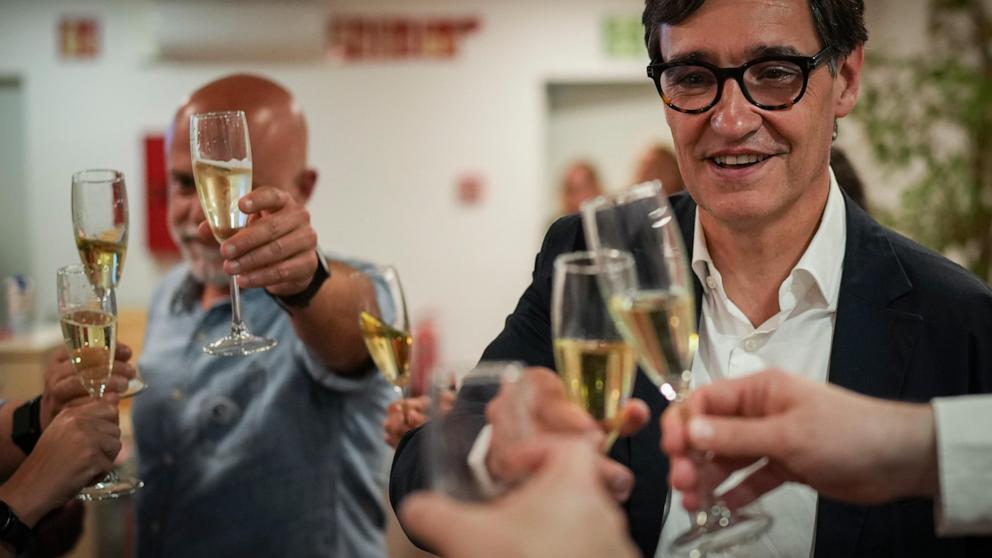Spain's ruling Socialist Party won a decisive victory in local elections in the powerful northeastern region of Catalonia, winning the most seats and dealing a blow to the region's two main separatist parties, which it has ruled for decades. Ta.
MADRID — Spain's ruling Socialist Party won a decisive victory in local elections in the powerful northeastern region of Catalonia, winning the most seats and dealing a blow to the two main separatist parties that have ruled the region for decades. Gave.
But candidate Salvador Ira failed to win a majority in Sunday's vote and will face tough negotiations if he hopes to form a government.
Mr. Illa's party won 42 seats, marking the first time in Catalonia that a socialist party led in both votes and seats. The result appears to be the perfect reward for Socialist Prime Minister Pedro Sánchez and his efforts in recent years to ease tensions in Catalonia, despite significant opposition from Spain's right-wing parties.
“The biggest takeaway from this election is that it was the worst result for Catalan independence forces since 1982,” said Andrew Dowling, an expert on Catalan history at Cardiff University in Wales.
But just as importantly, “this is a great result for Pedro Sánchez and a great result for the Madrid government,” Dowling said in a phone interview with The Associated Press on Monday.
However, Illa will need the support of 26 other MPs to form a government in Barcelona, which has 135 seats. Otherwise, he may try to get parties other than the proposed coalition to agree to abstain, making it easier for his party to win. simply the majority.
At present, he has the support of six members of the left-wing group Smar, which is forming a minority ruling coalition government in Madrid with Sanchez.
But he will still need support or abstention from another group, most likely from the pro-independence Republican left of incumbent Catalan president Pere Aragonés. But the party has plummeted from 33 seats to 20, and any deal supporting Ira could be suicidal.
Aragonés announced on Monday that he would not take a seat in the next parliament and would retire from front-line politics. He ruled out any deal with the Socialist Party or the right-wing Junts (Together) group led by Carles Puigdemont. A former regional president on the run.
Jantz came in second with 35 seats. Puigdemont, speaking from France on Monday, said he would seek to form a government with other separatist groups.
However, in reality, the four pro-independence parties, including Juntz, have a total of 61 seats, seven seats short of a majority. Most other political parties strongly oppose Mr. Puigdemont.
The quagmire is further complicated by the fact that Mr. Sanchez relies on support from Mr. Juntz and the left wing of the Republican Party to consolidate his power in Madrid.
This is essentially a move by Sanchez, who has sought to calm the situation in Catalonia in recent years by pardoning prominent imprisoned separatists and advancing the amnesty of hundreds of others, including the controversial Puigdemont. It was a reward for his decision.
Mr Puigdemont on Monday ruled out the possibility of Mr Illa threatening the central government if he was able to form a government in Barcelona.
The Socialist Party interprets Sunday's results as an end to Mr. Puigdemont's illegal separatist promotion.
“Catalan has decided to open a new era,” a triumphant Illa told supporters on Sunday night. “The voters of Catalonia have decided that the Socialist Party will lead this new era, and it is my intention to become the next president of Catalonia.”
Nuria Perlon, the party's spokeswoman in Catalonia, said on Monday that the Socialists hope to form a government with support from the left wing of the Republican Party and Smar. She denied Mr. Puigdemont's initiative.
“We do not support Mr. Puigdemont's inauguration. The people have spoken clearly and at this moment the independence movement does not have a legitimate majority demanding this government led by Carles Puigdemont,” Parlon said. .
Separatists have controlled local government in Barcelona since 2012, winning majorities in four consecutive local elections. However, opinion polls and the July national election showed support for leaving was declining.
Cardiff University's Professor Dowling believes Mr Illa has the best chance of forming a government, with abstentions from the right-wing Popular Party and the far-right VOX, which dislike the whole idea of Catalan separatism. Not excluded.
But he also challenged the possibility of a “completely surprising” government jointly led by the Socialist Party and the Junz Party, noting that the two parties actually have much in common on economic issues as the independence movement loses strength. , claimed that the two parties together would have an absolute majority.
“There will be a lot of backroom deals to consider,” he said. “There are so many moving plates.”
The newly elected members are scheduled to take their seats on June 10th.
____
Wilson contributed from Barcelona, Spain.


